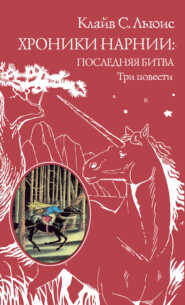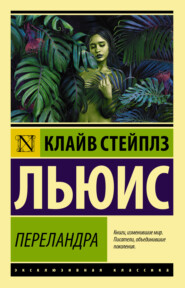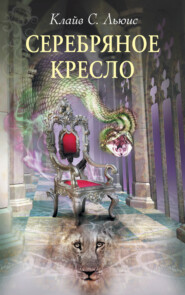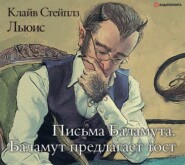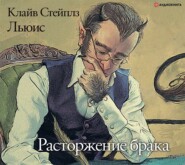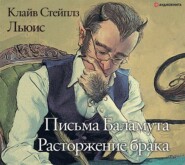По всем вопросам обращайтесь на: info@litportal.ru
(©) 2003-2024.
✖
Collected Letters Volume Three: Narnia, Cambridge and Joy 1950–1963
Настройки чтения
Размер шрифта
Высота строк
Поля
172 (#ulink_6a5843e9-761b-5df3-a5d0-b19c03094af6) John Calvin (1509-64) maintained in his Institutes of Christian Religion (1536), Bk. II, ch. 1, section 8, that: Our nature is not only utterly devoid of goodness, but so prolific in all kinds of evil, that it can never be idle…everything which is in man, from the intellect to the will, from the soul even to the flesh, is defiled.’ The ‘other view’ was that of the Arminians, after Jacobus Arminius (1560-1609). They insisted that the divine sovereignty was compatible with a real human free will; that Jesus Christ died for all and not just for the elect.
173 (#ulink_4551c0c6-6a82-519d-85f3-4319d3f5ef79)English Literature in the Sixteenth Century, Introduction, p. 34: ‘In a single sentence of the Tischreden [Table Talk] Luther tosses the question aside for ever. Do you doubt whether you are elected to salvation? Then say your prayers, man, and you may conclude that you are.’
174 (#ulink_0ba5aaef-645b-5195-bd59-821f9d449d6d) Lewis had received a letter dated 23 June 1953 from the Seminario Presbiteriano Do Sul, Campinas, Est. de S. Paulo, Brazil, in which the Librarian of the Seminary wrote: ‘We have a deep regard for your wonderful books on Christianity and its stand today. Of course, for quite a long time we have been eager to acquire them. However, we have no funds available for this purpose. Hence, we felt that perhaps you might be willing to offer them, as well as any other works you might think it fitting, to our library, at this Seminary’ (Bodleian Library, Dep. c. 771, fol. 30).
175 (#ulink_9a508840-899d-5e40-90c1-9c582f9085fa) The letter is unsigned.
176 (#ulink_c0175e0f-0ea8-5129-ad02-3d2caa032745) 1 John 1:5: ‘God is light, and in him is no darkness at all.’
177 (#ulink_c0175e0f-0ea8-5129-ad02-3d2caa032745) Lewis probably had in mind the ‘hard sayings’ of Jesus, among them Matthew 7:13: ‘Enter ye in at the strait gate: for wide is the gate, and broad is the way, that leadeth to destruction, and many there be which go in thereat’; Matthew 13:49-50: ‘So shall it be at the end of the world: the angels shall come forth, and sever the wicked from among the just, And shall cast them into the furnace of fire: there shall be wailing and gnashing of teeth’; Matthew 25:41: ‘Then shall he say…unto them on the left hand, Depart from me, ye cursed, into everlasting fire, prepared for the devil and his angels’.
178 (#ulink_8f38bdc8-6a19-5f0e-b0de-f07ab165c207) Luke 9:55.
179 (#ulink_0bb21f68-ce0a-5c5c-8327-ba3c9baf6b01) 1 Peter 4:8.
180 (#ulink_a4c4e449-f85f-55b7-8444-411b16d52a78) Lewis probably had in mind Colossians 1:24: ‘I rejoice in my sufferings for your sake, and in my flesh I complete what is lacking in Christ’s afflictions for the sake of his body, that is, the church’ (RSV).
181 (#ulink_6ba42dbd-d52f-51a6-bda7-c4eefebc310f) Matthew 6:25-6: ‘“Therefore I tell you, do not be anxious about your life, what you shall eat or what you shall drink, nor about your body, what you shall put on. Is not life more than food, and the body more than clothing? Look at the birds of the air: they neither sow nor reap nor gather into barns, and yet your heavenly Father feeds them. Are you not of more value than they?…’” (RSV).
182 (#ulink_385afc72-14cd-594e-b681-d09c757fdf54)Prince Caspian, ch. 8: ‘When they came out into the daylight Edmund turned to the Dwarf very politely and said, “I’ve got something to ask you. Kids like us don’t often have the chance of meeting a great warrior like you. Would you have a little fencing match with me? It would be frightfully decent.” ‘
183 (#ulink_5b994c51-0059-5278-806b-1e3fffb52f4f)The Silver Chair.
184 (#ulink_f402ded8-79dc-5296-b425-833a869d1bb5) Sir Walter Scott, Ivanhoe (1819).
185 (#ulink_57038c80-8af1-52ec-b7c1-96d885741350) See the letter to Bodle of 31 December 1947 (CL II, p. 823).
186 (#ulink_339a59a3-e156-543b-a4ca-54387e9f2c06) The name given to the planet Earth in Lewis’s interplanetary trilogy.
187 (#ulink_339a59a3-e156-543b-a4ca-54387e9f2c06) Roger Lancelyn Green, Tellers of Tales: An Account of Children’s Favourite Authors from 1839 to the Present Day (1946; new edn, 1953).
188 (#ulink_f28cdecc-b020-52de-ba49-85174162622c) For Don Giovanni Calabria’s letter of 3 September 1953 see Letters: C. S. Lewis-Don Giovanni Calabria, pp. 84-7.
189 (#ulink_f28cdecc-b020-52de-ba49-85174162622c) Giovanni Calabria, Instaurare Omnia in Christo (Verona: Vescovile Casa Buoni Fanciulli, 1952).
190 (#ulink_0b52d40f-03b3-5cdf-9c53-8947fbc58cb9) Horace, Ars Poetica, 169-74: ‘Multa senem circumveniunt incommoda, vel quod quaerit et inventis miser abstinet ac timet uti,/vel quod res omnis timide gelideque ministrat,/dilator, spe longus, iners, avidusque futuri,/difficilis, querulus, laudator temporis acti/se puero, castigator censorque minorum’: ‘Many troubles assail an old man, whether because he seeks gain, and then wretchedly abstains from what he possesses and is afraid to use it, or because he attends to all his affairs feebly and timidly; a procrastinator, he is apathetic in his hopes and expectations, sluggish and fearful of the future, obstinate, always complaining; he devotes himself to praising times past, when he was a boy, and to being the castigator and moral censor of the young.’
191 (#ulink_a26fdea6-7d8c-54fa-aafe-4be3046974ba) 2 Corinthians 1:3.
192 (#ulink_87df78d8-da35-5bf4-b7d4-426ea50931b9) This had been Lewis’s chief intention in The Abolition of Man.
193 (#ulink_7d37d5ca-c2aa-5b41-9c3d-3bd5ca32c239) Herbert Read, The Green Child (1935).
194 (#ulink_7d37d5ca-c2aa-5b41-9c3d-3bd5ca32c239) The French composer, Olivier Messiaen (1908-92).
195 (#ulink_fd3a2d97-23a2-5e9f-a408-c764ecb429bc) Probably Douglas Edison Harding, author of The Hierarchy of Heaven and Earth.
196 (#ulink_758fcb1a-366f-592d-adf4-f4593d6074c9) In The Hone and His Boy.
197 (#ulink_758fcb1a-366f-592d-adf4-f4593d6074c9) ibid., ch. 7.
198 (#ulink_7db9cf00-c825-50a8-a646-eff5baed11a9) Lewis was referring to Rachel, son of Laban. According to Genesis 29:20: ‘Jacob served seven years for Rachel.’ In her note to his letter Pitter said: ‘I had now known Lewis for seven years, and thought perhaps he would not mind if we now used Xtian names…I had asked “if I might now have Rachel”, alluding to Jacob’s seven-year service’ (Bodleian Library, MS. Eng. lett. c. 220/3, fol. 119).
199 (#ulink_22bb11c6-3128-52ae-a1e1-b024e4d4e8fa) The foolish clergyman in Jane Austen’s Pride and Prejudice (1813), who is excessively obsequious to persons of high rank.
200 (#ulink_42af534c-20fa-5af5-a10b-d281ad5e51dc) G. A. L. Burgeon (Owen Barfield), This Ever Diverse Pair, introduction by Walter de la Mare (London: Gollancz, 1950). See the description of this book in CL II, p. 937n.
201 (#ulink_007140cf-94ef-5cf1-9ccf-5360aac56892) Charlotte M. Yonge, The Daisy Chain (1856); The Trial (1864); The Pillars of the House (1873); The Three Brides (1876); The Two Sides of the Shield (1885); Dynevor Terrace (1857); Nutty’s Father (1886).
202 (#uf0eff0ee-9725-5d73-b672-7a49322c054c) John Richards (1918-95) was born in London on 23 June 1918. He went to Brockley County School in Forest Hill, after which he read English at King’s College, London. Before he could complete his degree the Second World War intervened and he spent most of the war years working in an anti-aircraft battery in Northern Ireland. After VE Day Richards was transferred to the Foreign Office. He soon left, returning to King’s College to complete his degree. In 1949 he realized his long-time ambition and began work in the Ministry of Education, where he served as Under-Secretary, 1973-7. A convert to Roman Catholicism in 1940, he afterwards contributed to many Catholic periodicals. See Lewis’s letter to Richards of 5 March 1945 in the Supplement.
203 (#ulink_edb911ac-2aac-5126-ab63-e9bf4441dc5a) Charlotte M. Yonge, The Heir of Redclyffe (1853).
204 (#ulink_4c1aed74-7dc3-5714-9359-5140b9bca77e) i.e., The Splendid Century.
205 (#ulink_4c1aed74-7dc3-5714-9359-5140b9bca77e) John Forrest, who had just died, was the husband of Lewis’s cousin, Gundreda Ewart Forrest. See The Ewart Family in the Biographical Appendix to CL I.
206 (#ulink_8e5457ee-8320-5899-8186-126c847fbcfc) The words ‘better the frying pan than the fire’ were removed from The Silver Chair before the book was published.
207 (#ulink_c981bf3e-0e59-5d66-989a-aa7b4d30250e) Lewis had probably been asked to examine J. B. Phillips’s translation of Acts, The Young Church in Action: The Acts of the Apostles, published by Geoffrey Bles in 1955. The reference is to Phillips’s translation of Acts 2:22-4.
208 (#ulink_6e156f6d-73e8-5c78-83a1-151a5bf7ad46) The fourteenth-century manor Dartington Hall was bought in 1925 by Leonard and Dorothy Elmhirst, who opened it in 1926 as an experiment in co-education. From the first one of its purposes was to renovate the large Dartington Hall estate. The school featured a ‘pupil-defined curriculum’ based upon the individual. There were few rules for older students, no uniforms, no religious education, and no church services. Emphasis was placed on ‘co-operation rather than competition’. Lewis’s pupil, Mary Neylan, taught there for a number of years. See Mary Neylan in the Biographical Appendix to CL II, pp. 1054-5.
209 (#ulink_6e156f6d-73e8-5c78-83a1-151a5bf7ad46) The school in The Silver Chair.
210 (#ulink_952dc300-df6c-5600-8f6b-9eb7364d66c0) Edgar Allan Poe, The Narrative of Arthur Gordon Pym of Nantucket (1850).
211 (#ulink_8a3d325c-33d5-55f0-93b7-dc0307b9b8af) ‘for the prayers’.
212 (#ulink_2db9bbdc-6165-5c79-a985-7ca44a583450) Congregation of Sisters of the Holy Redeemer, a lay order within the Order of the Holy Cross.
213 (#ulink_2db9bbdc-6165-5c79-a985-7ca44a583450)Book of Common Prayer, Collect for Whitsunday.
214 (#ulink_19afd368-2a2d-5e3c-8e8c-8c21e5494e8f) The story is told of a friend saying to Sir Winston Churchill, ‘How wonderfully your new grandson looks like you.’ ‘All babies look like me,’ replied Sir Winston. ‘But then, I look like all babies.’
215 (#ulink_19afd368-2a2d-5e3c-8e8c-8c21e5494e8f) William Wordsworth, ‘Ode, Intimations of Immortality from Recollections of Early Childhood’ (1807), 63-6: ‘Not in entire forgetfulness,/And not in utter nakedness,/ But trailing clouds of glory do we come/From God, who is our home.’
216 (#ulink_6c71c3ef-0e82-5c59-9a48-2ef4dfd60676) i.e., Florence ‘Michal’ Williams, the widow of Charles Williams.
217 (#ulink_1e733f75-741b-549a-82f0-c9a8beb0c204) Lewis forgot he had asked Bles, in his letter of 20 October, to remove the words from The Sliver Chair.
218 (#ulink_084fe4b8-77aa-5df9-847d-c0f2b7417cde) Romans 8:26-7: ‘We know not what we should pray for as we ought: but the Spirit itself maketh intercession for us with groanings which cannot be uttered. And he that searcheth the hearts knoweth what is the mind of the Spirit, because he maketh intercession for the saints according to the will of God.’
219 (#ulink_084fe4b8-77aa-5df9-847d-c0f2b7417cde) Luke 18:2: ‘And he spake a parable unto them to this end, that men ought always to pray, and not to faint.’
220 (#ulink_b09ff645-2207-58da-8019-6b2b9c32b5e9) Luke 22:42.
221 (#ulink_b09ff645-2207-58da-8019-6b2b9c32b5e9) Mark 11:24: ‘Therefore I say unto you, What things soever ye desire, when ye pray, believe that ye receive them and ye shall have them.’








